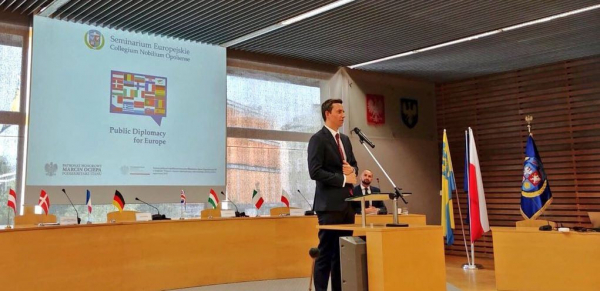Public diplomacy for Europe

Marcin Ociepa – a Member of the ECR Group in the European Committee of the Regions and Deputy Minister at the Ministry of Entrepreneurship and Technology in Poland – was the principal host of a debate on "Public diplomacy for Europe" held in Opole and Warsaw on 28-30 August. Participants at the conference emphasised that local and regional authorities remain one of the main pillars of European Union policy.
The conference, organised by the Regional Centre for International Debates (Regionalny Ośrodek Debaty Międzynarodowej) and the Collegium Nobilium Opoliense and taking the form of a European seminar, brought together dozens of local and regional elected representatives and politicians from Poland, Germany, France, Italy, Denmark and Hungary, including three representatives of the ECR Group. One of the goals of the meeting was to assess the role of international contacts between local and regional authorities in the economic, scientific and cultural spheres.
Marcin Ociepa argued that investing in international contacts between local and regional authorities often leads to tangible results, albeit sometimes only after a number of years.
"Public diplomacy creates long-lasting relationships, independently of high-level politics. Many current politicians and members of government used to hold positions in local and regional authorities. Contacts forged in the past often pay off in the form of specific investments because they have helped build a relationship rooted in mutual trust. This is not just a form of 'local government tourism', as some people see it. Contacts forged between local authorities in different countries can, over time, turn into specific economic agreements. Today's conference is a good example. A large number of participants will continue the discussions in our Ministry," said the Deputy Minister.
"We are united in our belief in European integration; however, we are divided by the specific vision of this integration. We talk about the European Union as a community of homelands," said Mr Ociepa. "We believe that it is the economy that provides the easiest way to achieve European integration. Currently, the biggest disputes within the European Union are about ideologies, and imposing a certain Brussels-based ideology. But we can clearly see that the best results come when we connect people from the worlds of business, science and culture. To my mind, public diplomacy and economic diplomacy are much more effective than the divided diplomacy of European countries, let alone the European Commission," he added.
Adam Banaszak, the head of the Polish delegation in the ECR Group of the European Committee of the Regions, pointed out that public diplomacy can have a positive effect on nationwide policies.
"Discussions between local and regional authorities are usually free from high-level politics, but this doesn't mean that they have no impact on this level. The robust, bottom-up impetus generated by individual countries' local governments can often carry over to a higher level, to the benefit of both sides at national level," said Mr Banaszak.
As well as the politicians already mentioned, conference participants included Piotr Wawrzyk, Vice-Minister for Foreign Affairs; Dr Marek Cichocki; Matteo Bianchi, an Italian MP and Member of the ECR Group in the European Committee of the Regions; Evelyne Temmam, Vice-Mayor of Vence (France); Péter Róth, Vice-Mayor of Székesfehérvár (Hungary); Edward Wąsiewicz, Honorary Consul of Austria in Wrocław; and Neva Sadikoglu-Novaky, Secretary-General of the ECR Group in the European Committee of the Regions.

